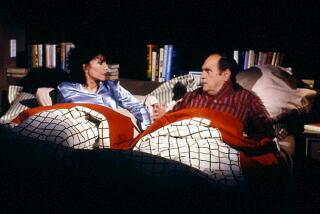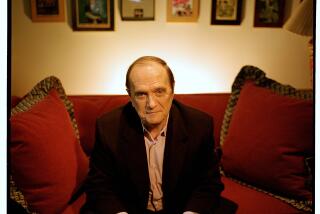Dick Clark’s On a Roll : He Tunes In to TV Trends
Dick Clark concluded his 1976 autobiography, “Rock, Roll & Remember,” with a chapter titled “I have a secret wish that ‘Bandstand’ will go on forever.”
Another not-so-secret wish is for Clark’s “American Bandstand” to go on forever as an hourlong program. Last September, the American Broadcasting Co., citing declining ratings for “American Bandstand,” trimmed the hourlong sock hop to 30 minutes. The network filled its time slot with a cartoon show called “The Littles,” about a family of tiny people who live in the walls of a home.
So Clark, who has described “American Bandstand” as “like a child I’ve raised,” bluntly let the network know what he thought of the decision. “I was rather crude in my reaction. It was a two-word response,” he said.
Come September, “American Bandstand,” the longest-running variety program in television history--it premiered on the ABC network on Aug. 5, 1957--will no longer be on the network because Clark is selling it into first-run syndication on independent television stations and network affiliates. In the end, Clark may make more money with “American Bandstand” in syndication because such programs can often bring in more money than the networks pay in license fees.
Years ago, Clark, once best known as America’s premier Saturday afternoon record spinner, wouldn’t have been in a position to sidestep the network. Now he is. In the past 10 years, his Burbank production company, Dick Clark Productions, has emerged as one of the busiest producers in television, responsible for some 114 hours of programming during the current television season.
Still, there’s a nagging need for Dick Clark Productions to keep churning out new programs to diversify. Two shows, “American Bandstand” and Clark’s “TV Bloopers and Practical Jokes,” provided more than half of the company’s gross profit in the past three years.
The company also needs to lessen its dependence on Clark, whom the company has insured for $5 million. As hard as he works, Clark knows that he can’t do it all himself. So last January, Dick Clark Productions went public, selling 1.27 million shares of stock at $6.50 a share and raising $8.2 million to finance program development. The offering also will enable Clark to use stock options as a lure to attract experienced executives, producers and writers.
The public offering for the company, which earned $3.8 million on $32.3 million in revenue in the year ended June 30, was somewhat unexpected. Last August, an article on Clark in Newsweek magazine, citing Clark’s obsession with financial privacy, declared, “Don’t count on ever being able to buy stock in a Dick Clark company.”
But the reality is that Clark turns 58 this Nov. 30. In other words, the man known as “America’s oldest teen-ager” will be eligible to collect his Social Security old-age benefits in a little more than seven years.
Clark, however, said he feels 40 and has no plans to retire.
“I don’t really relate to my age. I’m not 57, physically or mentally,” he said.
Clark doesn’t keep working because he needs the money. His personal wealth was estimated last year by Forbes magazine at more than $180 million.
His cash compensation from Dick Clark Productions for the year ended June 30 was $1.56 million, according to a prospectus. On top of that, the prospectus said, he received $1.1 million in performance fees from the company and $171,000 in executive producing fees. That money doesn’t include what he makes as host of two game shows, “$25,000 Pyramid” and “$100,000 Pyramid,” produced by other firms.
In addition, Clark and his wife, Karen, own 5.7 million shares of his company’s common stock that have a current market value of more than $31 million based on Monday’s closing price of $5.50 a share.
They also own 675,000 shares of Class A stock, which is not traded publicly, giving them control over a 77% stake in the company.
Overall, the company has 11 television series and specials scheduled for syndicated and network airings next season, and is trying to sell three more pilots. Another seven television movies, three feature films and one dramatic series are in advanced stages of development. The company is also considering six game show ideas.
Besides “American Bandstand,” the company’s offerings include “Puttin’ On the Hits,” “Keep on Cruisin’,” seven annual specials such as the “American Music Awards” and syndicated reruns like “TV’s Bloopers & Practical Jokes.”
Clark’s involvement in television is so widespread that comedian David Letterman describes Clark as someone who has “hosted and produced more TV programs than any human breathing air today.” As a joke, Letterman has campaigned for a “one person, one show” rule.
But some analysts think that Clark’s company still doesn’t offer a broad enough base of programming to grow dramatically. “He provides a filler, but they aren’t programs that stick in your mind as a viewer. No network is going to build a rating schedule around him,” said Harold Vogel, an entertainment analyst with Merrill Lynch Capital Markets.
Among the programs in development are “You Are the Jury,” in which viewers watch a courtroom drama and render a verdict using a special telephone number, and “The Lou Kelly Show,” a talk show hosted by a puppet.
One plus for the company is the new cost-cutting push in television. With cost-conscious executives such as Laurence A. Tisch of CBS and Thomas F. Murphy of ABC in control of the networks, producers are having to learn to live with less. But Clark has a reputation for providing inexpensive programs by skimping on frills and by completing work quickly, which Clark attributes to his experience doing live television.
“Out of all this chaos there is a profit to be made. Dismal pictures are being painted, but the bottom line is that something must be put on those screens,” Clark said.
Television critics don’t always like what they see, however. Tom Shales, the Washington Post’s television critic, wrote that Clark “is compiling a dismally consistent record of strained mediocrity in television production.”
For his part, Clark contends that television critics are low-paid failures. He said his programs have been shown to be popular with viewers. “It doesn’t make me happy to have an erudite, scholar-type guy at a keyboard tapping on my skull with criticism,” he said. “But it doesn’t seem to affect the bottom line.”
Still open to question is whether “American Bandstand” is becoming dated at last, as some television executives believe. Jennie Trias, ABC’s vice president of childrens programs series, said the ratings for “American Bandstand” had slipped to less than 10% of the TV sets on during its early afternoon time period.
That compares to about 14% in the early 1980s, she said.
“It was not performing as strongly as it has in previous years,” Trias said. “It’s going up against fierce competition like MTV and other video music shows. American Bandstand is quite tame compared to that.”
Still, Clark President Francis La Maina said he expects “American Bandstand” to make at least as much in syndication as it did on the network, and probably more.
Despite his prolific production record, Clark doesn’t always get what he wants. He tried aggressively, but unsuccessfully, to make a television movie called “Murder in the Ministry” about the 1983 murder of Sandra Bird of Emporia, Kan., by her husband, the Rev. Thomas Bird.
Clark bought the rights to the story from Sandra Bird’s family. But he was beaten out by “Murder Ordained,” another version that tells the story from a state trooper’s perspective. The series concludes tonight on CBS. Ironically, ABC ran a Clark program honoring the mothers of celebrities on the air on Sunday opposite the movie.
“This was as sure a shot as you could think of,” said Dan Paulson, Clark’s vice president of movies and series. “But we got beat.”
The reason Clark works relentlessly has more to do with his insatiable desire to be successful in television. In his autobiography, he said he wanted to be known for doing something “other than Clearasil commercials” during his career.
“Proving he can do it again, again and again is important to Dick,” said Gene Weed, Clark’s vice president of television.
Clark is involved in each project, often working in the control room during a taping and making suggestions. He calls the office constantly even while traveling in faraway places like mainland China or the south of France. One night, colleagues said, Clark was about to drive a script over to the home of an agent himself before a messenger was finally found.
But Dick Clark the entertainer is never far from Dick Clark the businessman. Two years ago, Clark was supervising an NBC program called “The Most Beautiful Girl in the World,” a beauty contest broadcast live from Sydney, Australia, in which viewers were to vote using a special telephone number.
Richard Ludwin, NBC’s vice president of specials, recalled that there were technical problems at the start of the program. Unfazed, Clark walked from the control room to a camera, Ludwin said, to tell the audience of the problems. Clark then killed time until the problems were fixed by interviewing the previous year’s winner.
DICK CLARK PRODUCTIONS AT A GLANCE
Founded in 1957, the company develops and produces television programs, including “American Bandstand,” “Puttin’ On the Hits” and the “American Music Awards.”
More to Read
The complete guide to home viewing
Get Screen Gab for everything about the TV shows and streaming movies everyone’s talking about.
You may occasionally receive promotional content from the Los Angeles Times.






